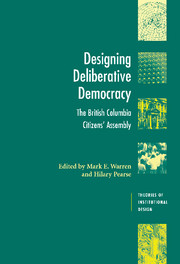Crossref Citations
This Book has been
cited by the following publications. This list is generated based on data provided by Crossref.
Thompson, Dennis F.
2008.
Deliberative Democratic Theory and Empirical Political Science.
Annual Review of Political Science,
Vol. 11,
Issue. 1,
p.
497.
Urbinati, Nadia
and
Warren, Mark E.
2008.
The Concept of Representation in Contemporary Democratic Theory.
Annual Review of Political Science,
Vol. 11,
Issue. 1,
p.
387.
Snider, J.H.
2008.
Would You Ask Turkeys to Mandate Thanksgiving? The Dismal Politics of Legislative Transparency.
SSRN Electronic Journal,
Mansbridge, Jane
2009.
A “Selection Model” of Political Representation*.
Journal of Political Philosophy,
Vol. 17,
Issue. 4,
p.
369.
Smith, Graham
2009.
REVITALISING POLITICS THROUGH DEMOCRATIC INNOVATION?.
Representation,
Vol. 45,
Issue. 3,
p.
259.
Warren, Mark E.
2009.
Governance-driven democratization.
Critical Policy Studies,
Vol. 3,
Issue. 1,
p.
3.
Snider, J.H.
2009.
The Case for Redistricting Juries: Lessons from British Columbia’s Revolutionary Experiment in Democratic Reform.
SSRN Electronic Journal,
Chambers, Simone
2009.
Rhetoric and the Public Sphere.
Political Theory,
Vol. 37,
Issue. 3,
p.
323.
Johnson, Genevieve Fuji
2009.
Deliberative Democratic Practices in Canada: An Analysis of Institutional Empowerment in Three Cases.
Canadian Journal of Political Science,
Vol. 42,
Issue. 3,
p.
679.
Skelcher, Chris
and
Torfing, Jacob
2010.
Improving democratic governance through institutional design: Civic participation and democratic ownership in Europe.
Regulation & Governance,
Vol. 4,
Issue. 1,
p.
71.
Gershtenson, Joseph
Rainey, Glenn W.
and
Rainey, Jane G.
2010.
Creating Better Citizens? Effects of a Model Citizens' Assembly on Student Political Attitudes and Behavior.
Journal of Political Science Education,
Vol. 6,
Issue. 2,
p.
95.
Dryzek, John S.
2010.
Rhetoric in Democracy: A Systemic Appreciation.
Political Theory,
Vol. 38,
Issue. 3,
p.
319.
Hartz-Karp, Janette
Anderson, Patrick
Gasti, John
and
Felicetti, Andrea
2010.
The Australian Citizens' Parliament: forging shared identity through public deliberation.
Journal of Public Affairs,
Vol. 10,
Issue. 4,
p.
353.
Tremblay, Manon
2010.
Bilan des réformes électorales au Canada : Quelle place pour les femmes?.
Canadian Journal of Political Science,
Vol. 43,
Issue. 1,
p.
25.
Kurki, Milja
2010.
Democracy and Conceptual Contestability: Reconsidering Conceptions of Democracy in Democracy Promotion.
International Studies Review,
Vol. 12,
Issue. 3,
p.
362.
Setälä, Maija
Grönlund, Kimmo
and
Herne, Kaisa
2010.
Citizen Deliberation on Nuclear Power: A Comparison of Two Decision-Making Methods.
Political Studies,
Vol. 58,
Issue. 4,
p.
688.
Nullmeier, Frank
and
Pritzlaff, Tanja
2010.
The implicit normativity of political practices. Analyzing the dynamics and power relations of committee decision-making.
Critical Policy Studies,
Vol. 3,
Issue. 3-4,
p.
357.
Muirhead, Russell
2010.
CAN DELIBERATIVE DEMOCRACY BE PARTISAN?.
Critical Review,
Vol. 22,
Issue. 2-3,
p.
129.
Hüller, Thorsten
2010.
Playground or Democratisation? New Participatory Procedures at the European Commission.
Swiss Political Science Review,
Vol. 16,
Issue. 1,
p.
77.
Smith, Graham
2011.
Survey Article Democratic Innovations: Bringing Theory and Practice into Dialogue.
Philosophy Compass,
Vol. 6,
Issue. 12,
p.
895.



